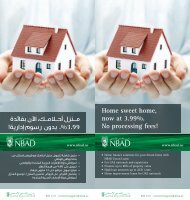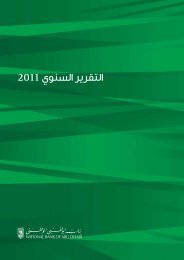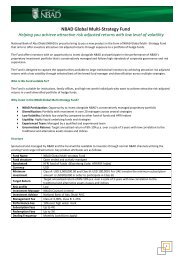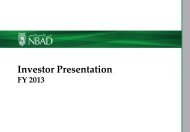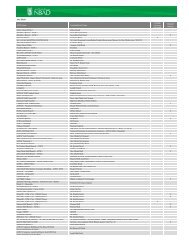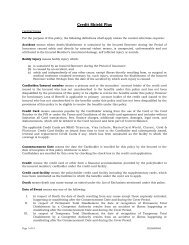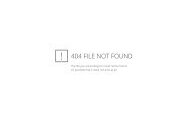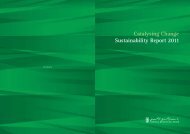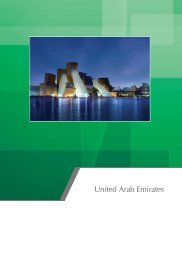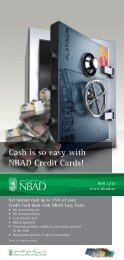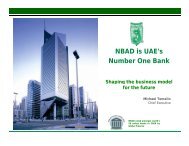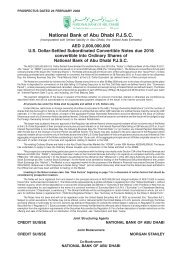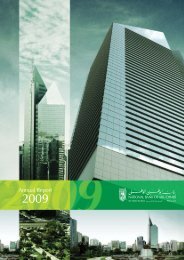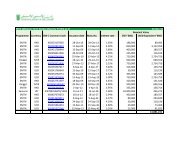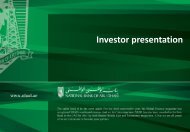- Page 2 and 3:
Creating relationships that create
- Page 4 and 5:
Broad horizon, local expertise, att
- Page 6 and 7:
Dubai International Financial Centr
- Page 9 and 10:
Editor / Author Gıyas Gökkent’s
- Page 11 and 12:
Table of Contents Page 3 Acknowledg
- Page 13 and 14:
Country Chapters 8. Bahrain 217 Eco
- Page 15 and 16:
Index - Charts & Tables Chapter 1 -
- Page 17 and 18:
171 Performance of Shariah Complian
- Page 19 and 20:
Chapter 9 - Egypt 242 Assets and Nu
- Page 21 and 22:
Chapter 15 - United Arab Emirates 3
- Page 25 and 26:
Global Trends Economic Developments
- Page 27 and 28:
Global Trends Worldwide funds exper
- Page 29 and 30:
Global Trends Breakdown of Global F
- Page 31 and 32:
Global Trends Fiduciary Assets of S
- Page 33 and 34:
Global Trends Focus: 2013 Outlook I
- Page 35 and 36:
Global Trends ING IM says that the
- Page 37 and 38:
Global Trends Mutual Fund Assets by
- Page 39 and 40:
Global Trends Selected Data by Coun
- Page 41 and 42:
Global Trends notably with the UAE,
- Page 43 and 44:
Global Trends investment managers o
- Page 45:
MENA Region Trends
- Page 48 and 49:
Middle East & North Africa In 2013,
- Page 50 and 51: Middle East & North Africa Fund Ass
- Page 52 and 53: Middle East & North Africa Number o
- Page 54 and 55: Middle East & North Africa Average
- Page 56 and 57: Middle East & North Africa d) In Du
- Page 58 and 59: Middle East & North Africa Q/ Which
- Page 60 and 61: Middle East & North Africa Trends b
- Page 62 and 63: Middle East & North Africa Equity F
- Page 64 and 65: Middle East & North Africa Fixed In
- Page 66 and 67: Middle East & North Africa curve an
- Page 68 and 69: Middle East & North Africa Focus: F
- Page 70 and 71: Middle East & North Africa 1) DFSA
- Page 73: GCC Region Trends
- Page 76 and 77: Gulf Cooperation Council Region Ind
- Page 78 and 79: Gulf Cooperation Council Region Ass
- Page 80 and 81: Gulf Cooperation Council Region Bre
- Page 82 and 83: Gulf Cooperation Council Region Ass
- Page 84 and 85: Gulf Cooperation Council Region Foc
- Page 86 and 87: Gulf Cooperation Council Region Mor
- Page 88 and 89: Gulf Cooperation Council Region Top
- Page 90 and 91: Gulf Cooperation Council Region Top
- Page 92 and 93: Gulf Cooperation Council Region 201
- Page 94 and 95: Gulf Cooperation Council Region Q/
- Page 96: Gulf Cooperation Council Region gol
- Page 102 and 103: Regulatory Trends Investor approach
- Page 104 and 105: Regulatory Trends thousand Dirhams
- Page 106 and 107: Regulatory Trends Q/ Article 4, cla
- Page 108 and 109: Regulatory Trends Q/ In a recent ne
- Page 110 and 111: Regulatory Trends Industry Perspect
- Page 112 and 113: Regulatory Trends identify higher-r
- Page 114 and 115: Regulatory Trends About Advent Soft
- Page 116 and 117: Regulatory Trends providers and tr
- Page 118 and 119: Regulatory Trends External Fund Ma
- Page 120 and 121: Regulatory Trends Exempt Funds Exe
- Page 122 and 123: Regulatory Trends All Property Fu
- Page 124 and 125: Dubai International Financial Centr
- Page 126 and 127: Dubai International Financial Centr
- Page 128 and 129: Dubai International Financial Centr
- Page 130 and 131: Dubai International Financial Centr
- Page 132 and 133: Dubai International Financial Centr
- Page 134 and 135: Bahrain / Kuwait Exchange Traded Fu
- Page 136 and 137: Bahrain / Kuwait Exchange Traded Fu
- Page 138 and 139: Bahrain / Kuwait Exchange Traded Fu
- Page 140 and 141: Bahrain / Kuwait Exchange Traded Fu
- Page 142 and 143: Bahrain / Kuwait Exchange Traded Fu
- Page 144 and 145: Bahrain / Kuwait Exchange Traded Fu
- Page 146 and 147: United Arab Emirates / Egypt Exchan
- Page 148 and 149: United Arab Emirates / Egypt Exchan
- Page 150 and 151:
United Arab Emirates / Egypt Exchan
- Page 152 and 153:
United Arab Emirates / Egypt Exchan
- Page 154 and 155:
Oman / Saudi Arabia Exchange Traded
- Page 156 and 157:
Oman / Saudi Arabia Exchange Traded
- Page 158 and 159:
Oman / Saudi Arabia Exchange Traded
- Page 160 and 161:
Oman / Saudi Arabia Exchange Traded
- Page 163 and 164:
Benchmarks GCC Overview Money marke
- Page 165 and 166:
Benchmarks Use of hybrid benchmarks
- Page 167 and 168:
Benchmarks Recent Developments Regi
- Page 169 and 170:
Benchmarks Arabia, Tunisia and the
- Page 171 and 172:
Benchmarks In May 2010, FTSE annou
- Page 173 and 174:
Benchmarks Equity Funds Performance
- Page 175 and 176:
Benchmarks Performance of Shariah C
- Page 177 and 178:
Benchmarks Performance of Conventio
- Page 179 and 180:
Benchmarks Performance of Conventio
- Page 181 and 182:
Benchmarks Fixed Income Funds Perfo
- Page 183 and 184:
Benchmarks Industry Perspective Ami
- Page 185 and 186:
Benchmarks Q/ Which firms (local /
- Page 187:
Benchmarks On a country level we ex
- Page 192 and 193:
Sharia Compliant Funds Saudi Arabia
- Page 194 and 195:
Sharia Compliant Funds Top 5 Sharia
- Page 196 and 197:
Sharia Compliant Funds While the re
- Page 198 and 199:
Sharia Compliant Funds Fund Flows I
- Page 200 and 201:
Sharia Compliant Funds it was liqui
- Page 202 and 203:
Sharia Compliant Funds MENA Overvie
- Page 204 and 205:
Sharia Compliant Funds Average Mutu
- Page 206 and 207:
Sharia Compliant Funds Average Asse
- Page 208 and 209:
Sharia Compliant Funds and saw net
- Page 210:
Sharia Compliant Funds Top MENA Sha
- Page 214 and 215:
Exchange Traded Funds Regional Back
- Page 216:
Exchange Traded Funds MENA Focused
- Page 220 and 221:
Bahrain to register a deficit of 4.
- Page 222 and 223:
Bahrain Number of Mutual Funds (end
- Page 224 and 225:
Bahrain Average Assets of Funds (mi
- Page 226 and 227:
Bahrain Number of New Funds (end of
- Page 228 and 229:
Bahrain Fund Assets by Investor Typ
- Page 230 and 231:
Bahrain Top 10 Bahrain Domiciled Mu
- Page 232 and 233:
Bahrain Focus: Industry Perspective
- Page 234 and 235:
Bahrain CBB Rulebook Volume 6 was i
- Page 236 and 237:
Bahrain - Directory Oman Nr Company
- Page 238 and 239:
Bahrain - Directory Oman 20 Global
- Page 240:
Bahrain - Directory Oman 42 Seera I
- Page 244 and 245:
Egypt Egyptian officials to ask for
- Page 246 and 247:
Egypt Breakdown of Domestic Funds b
- Page 248 and 249:
Egypt Top 10 Egypt Domiciled Funds
- Page 250 and 251:
Egypt - Directory Oman Nr Company P
- Page 252 and 253:
Egypt - Directory Oman 21 Housing &
- Page 255 and 256:
Kuwait Economic Developments In 201
- Page 257 and 258:
Kuwait Fund Operators, Breakdown by
- Page 259 and 260:
Kuwait In 2012Q2, 86% of domestic f
- Page 261 and 262:
Kuwait In 2011, assets of mutual fu
- Page 263 and 264:
Kuwait - Directory Oman Company Pho
- Page 265 and 266:
Kuwait - Directory Oman Al-Madina f
- Page 267 and 268:
Kuwait - Directory Gulf Investment
- Page 269 and 270:
Kuwait - Directory Manafae Investme
- Page 271:
Morocco
- Page 274:
Morocco Fund Trends According to Ba
- Page 278 and 279:
Oman Overview As of June 2012, ther
- Page 280:
Oman - Directory Oman Company Phone
- Page 284 and 285:
Qatar The non-oil sector will act a
- Page 286 and 287:
Qatar Qatar Central Bank publishes
- Page 288 and 289:
Qatar Breakdown of Investments Unde
- Page 290 and 291:
Qatar Focus: Recent developments in
- Page 292 and 293:
Qatar business. In 2012, over 60% o
- Page 294 and 295:
Qatar Count QFC # Firm Name License
- Page 296 and 297:
Qatar Investment Funds Licensed in
- Page 298 and 299:
Qatar Directory of Investment Compa
- Page 300:
Qatar - Directory Oman Investment H
- Page 304 and 305:
Saudi Arabia property. Banks previo
- Page 306 and 307:
Saudi Arabia Fund Industry Breakdow
- Page 308 and 309:
Saudi Arabia In 2011, the top 5 fir
- Page 310 and 311:
Saudi Arabia New Funds in 2011 Fund
- Page 312 and 313:
Saudi Arabia Number of New Funds by
- Page 314 and 315:
Saudi Arabia Number of Subscribers
- Page 316 and 317:
Saudi Arabia SAMA data indicate tha
- Page 318 and 319:
Saudi Arabia At the end of 2012Q3,
- Page 320 and 321:
Saudi Arabia Top 10 Saudi Domiciled
- Page 322 and 323:
Saudi Arabia Fund Assets in Tadawul
- Page 324 and 325:
Saudi Arabia - Directory Oman Compa
- Page 326 and 327:
Saudi Arabia - Directory Oman Jadwa
- Page 331 and 332:
United Arab Emirates Economic Devel
- Page 333 and 334:
United Arab Emirates Top Local Fund
- Page 335 and 336:
United Arab Emirates Breakdown of F
- Page 337 and 338:
United Arab Emirates Recent Fund La
- Page 339 and 340:
United Arab Emirates Fund Managers
- Page 341 and 342:
United Arab Emirates The first succ
- Page 343 and 344:
United Arab Emirates Top 10 UAE Dom
- Page 345 and 346:
United Arab Emirates - Directory Om
- Page 347 and 348:
United Arab Emirates - Directory Om
- Page 349:
ONE PLACE DIVERSIFYING Qatar. Where



